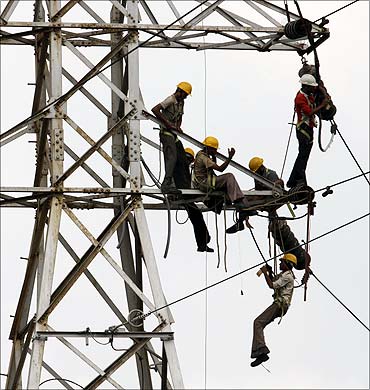PM says, all macro parameters have improved significantly in his 17 months, and a 'quiet revolution' is on, transformational but barely noticed.
 The country's macro economic parameters, said Prime Minister Narendra Modi on Friday, have improved on all counts in the 17 months of his government.
The country's macro economic parameters, said Prime Minister Narendra Modi on Friday, have improved on all counts in the 17 months of his government.
These were a result of well-thought policies. Broadening the domain of reforms to change the lives of the poor was needed, rather than impressing experts and improving the ranking of the country in “some international league table”.
His government's effort to bring back undisclosed money abroad had led to disclosures on Rs 10,500 crore or Rs 105 billion.
“Growth is up and inflation is down, foreign investment is up and the current account deficit is down, revenues are up...the fiscal deficit is down and the rupee is stable. Obviously, this did not happen by accident (but from)...a series of well-thought policies," he said at an inaugural address at the Delhi Economics Conclave. He gave various statistics in this regard.
Adding: “We have embarked on fiscal consolidation. We have entered for the first time into a monetary framework agreement with the Reserve Bank to curb inflation.”
Poverty
Terming reforms to transform India “a marathon and not a sprint”, Modi said such measures should aim at improving the lives of people. “My appeal to all of you is to think beyond conventional remedies. We should not limit our ideas of reforms to a few standard notions. (These) should be inclusive and broadbased. The goal of reform is not better headlines in the big papers but better lives for our people,” he said.
Empowering the poor was far more effective than empowering the poverty alleviation industry, he said. "Our financial reforms empower the poor to fight poverty themselves.”
The government’s JAM (Jan-Dhan, Aadhaar and Mobile) initiatives were about "achieving maximum values for every rupee spent, maximum empowerment and maximum technology penetration among the masses".
JAM was the main focus of discussion at the conclave on Friday, an annual event, organised by the Union ministry of finance. It is the first time a PM has inaugurated it. This year's theme is 'Realising India's JAM Vision'.
Graft
On corruption, Modi said the government had taken "decisive steps" to curb it, a menace constraining growth.
These included reforms in the working of state-owned banks, removal of discretion in allocation of key resources like coal, telecom spectrum, FM radio and so on, doing away with interviews for lower-level jobs, and introduction of electronic filing and scrutiny of tax returns, he said.
On illicit funds abroad, Modi said, "Our campaign against tax evasion and money laundering is well known. About Rs 6,500 crore was assessed before the new black money Act was implemented. Additionally, over Rs 4,000 crore has been declared under the new Act. Thus, Rs 10,500 crore of black money from abroad has been detected and assessed." Electronic return filing now covers 85 per cent of assessees, he added.
Deep change
He said the government had reduced wasteful expenditure through innovative methods. "Some of these are part of your agenda, such as using Aadhaar to target subsidies to the deserving. But, our reforms are far broader and far deeper than generally recognised."
He said there had been financial, structural and institutional reforms. For instance, in the past 17 months, 190 million people had been brought into the banking system.
"This is more than the population of most countries. Now, these millions are part of our banking system, and words like 'interest rate' have a meaning for them," he said.
Accounts opened under the Jan-Dhan Yojana have a total balance of almost Rs 26,000 crore. "Clearly," declared the PM, "our financial inclusion reform has been transformational. And, yet, this quiet revolution has hardly been noticed."
He also said the government had introduced healthy competition in the debit and credit card segment. "This has traditionally been dominated by a few international players...Today, 36 per cent of debit cards in India are RuPay (the scheme pushed by the government)," he added.
On formation of NITI Aayog, replacing the erstwhile Planning Commisison, the PM said: "My vision of NITI is very different from the Planning Commission. It is to be a collaborative forum for ideas and action, where states are full partners and where the Centre and states meet in a spirit of co-operative federalism."










 © 2025
© 2025